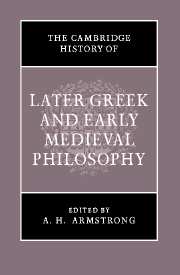Book contents
- Frontmatter
- Chapter 1 Introductory
- Part 1 GREEK PHILOSOPHY FROM PLATO TO PLOTINUS
- Part II PHILO AND THE BEGINNINGS OF CHRISTIAN THOUGHT
- Part III PLOTINUS
- Part IV THE LATER NEOPLATONISTS
- Part V MARIUS VICTORINUS AND AUGUSTINE
- Chapter 20 Marius Victorinus
- Chapter 21 Augustine. Biographical introduction: Christianity and philosophy
- Chapter 22 Augustine. Man: body and soul
- Chapter 23 Augustine. Reason and illumination
- Chapter 24 Augustine. Sense and imagination
- Chapter 25 Augustine. Human action: will and virtue
- Chapter 26 Augustine. God and nature
- Chapter 27 Augustine. Man in history and society
- Part VI THE GREEK CHRISTIAN PLATONIST TRADITION FROM THE CAPPADOCIANS TO MAXIMUS AND ERIUGENA
- Part VII WESTERN CHRISTIAN THOUGHT FROM BOETHIUS TO ANSELM
- Part VIII EARLY ISLAMIC PHILOSOPHY
- Select Bibliography
- Additional Notes and Bibliography
- Index of ancient and medieval works referred to in the text
- General Index
- Index of Greek terms
- References
Chapter 24 - Augustine. Sense and imagination
from Part V - MARIUS VICTORINUS AND AUGUSTINE
Published online by Cambridge University Press: 28 March 2008
- Frontmatter
- Chapter 1 Introductory
- Part 1 GREEK PHILOSOPHY FROM PLATO TO PLOTINUS
- Part II PHILO AND THE BEGINNINGS OF CHRISTIAN THOUGHT
- Part III PLOTINUS
- Part IV THE LATER NEOPLATONISTS
- Part V MARIUS VICTORINUS AND AUGUSTINE
- Chapter 20 Marius Victorinus
- Chapter 21 Augustine. Biographical introduction: Christianity and philosophy
- Chapter 22 Augustine. Man: body and soul
- Chapter 23 Augustine. Reason and illumination
- Chapter 24 Augustine. Sense and imagination
- Chapter 25 Augustine. Human action: will and virtue
- Chapter 26 Augustine. God and nature
- Chapter 27 Augustine. Man in history and society
- Part VI THE GREEK CHRISTIAN PLATONIST TRADITION FROM THE CAPPADOCIANS TO MAXIMUS AND ERIUGENA
- Part VII WESTERN CHRISTIAN THOUGHT FROM BOETHIUS TO ANSELM
- Part VIII EARLY ISLAMIC PHILOSOPHY
- Select Bibliography
- Additional Notes and Bibliography
- Index of ancient and medieval works referred to in the text
- General Index
- Index of Greek terms
- References
Summary
Sense-knowledge, as Augustine always insists, is, like all knowledge, a work of the soul, not of the bodily organs; it is a work ‘of the soul by means of the body’. All his more sustained discussions of this type of knowledge are attempts to make comprehensible the way in which the mind uses the bodily organs of sense in obtaining knowledge from sense-experience. His treatment of sensation (sentire) is therefore in line with his view of man as a soul using a body, and the analogy of the craftsman using his tools is the model on which it is constructed. Thus he begins the long discussion of this topic in his De quantitate animae with the following definition: ‘sensation consists in the mind's awareness of the body's experience’. A necessary condition of sensation, according to this definition, is the encounter between the bodily sense-organ and the object perceived; but sensation is more than this physical encounter on which it depends, and involves the mind's awareness. The definition assimilates sensation to the category of passio or, more precisely, to an awareness by the mind of what the body ‘suffers’. Augustine deals at length with the difficulties of treating sensation in these terms. What, he asks, do the eyes ‘suffer’ in seeing something? Evodius, his interlocutor in the dialogue, invokes the analogy of feeling pain and emotions: what the eyes suffer when seeing is sight itself, just as a sick man suffers sickness or a rejoicing man joy.
- Type
- Chapter
- Information
- Publisher: Cambridge University PressPrint publication year: 1967



